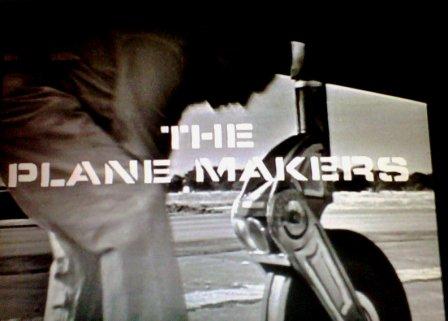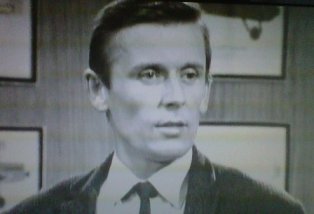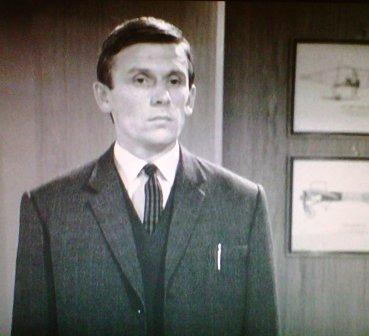

Tuesday 1 December 1964
“A Question of Supply” Writer Arthur Swinson Director Josephine Douglas

“I don’t think that moral philosophy is going to help us. We’re technical men and we’ve a technical problem to face! Let’s get on with it!” David Corbett
Henry Forbes is carrying out low-level tests in the VTOL when the autopilot fails to engage. Forbes grabs control of the plane and averts a crash. At Radley Heath airfield, Corbett accuses Forbes of almost wrecking the plane, but Henry angrily defends himself and Dunnett, his observer. “There were no red lights flashing. It’s a system fault.”.
Corbett finally accepts that there’s a fault in the radar when he gets confirmation from the Ministry of Defence that parallel tests at Boscombe Down have had the same problem. The radar is an American design, made under license by a British firm. Corbett meets with the Ministry officials; Nightingale (Geoffrey Chater) who is anxious that the VTOL is delivered to the RAFT on schedule and Hunt (John Crocker) who argues the radar is fundamentally sound. Corbett wants to replace the radar and when Hunt says the only British alternative is too large for the VTOL and doesn’t work at supersonic speeds, Corbett argues that they should go direct to the American manufacturer.
Nightingale warns Corbett that taking the contract from Browning’s may cause hardship in a high unemployment area. In the House of Commons, James Cameron-Grant is approached by Sir Henry Manning, Conservative MP for the constituency containing Brownings, who asks him to use his influence as publicist for Scott Furlong. “Work’s hard to come by up there, lad.”
Both Henderson and Cameron-Grant warn Corbett that this technical problem has political elements and that he should leave the problem to Wilder (who is in Paris). Corbett is determined that nothing should delay the VTOL and meets with the Minister (John Harvey) to push for the American deal. A radar is flown over from America and performs perfectly in a test flight. However, the Americans then say they can’t supply in quantity for 12 months. As Corbett and the civil servants meet to try and find a solution, Sir Henry Manning breaks the story in the House and the Minister comes under attack for betraying British industry.
The answer finally comes from Lockett (George Waring), a Scott Furlong technician who has stripped down the British and American radars for comparison. There was a small modification to the American set which wasn’t incorporated in the British set. He thinks overheating caused the radar to drift. With the low-level radar reassembled to specification, Forbes and Dunnett take the VTOL back up to repeat the near-fatal test. This time the auto-pilot avoids the ground without intervention. As the VTOL flies past the airfield, Corbett orders three bottles of whisky from the board room. One each for Forbes and Dunnett, the third for Lockett.

Written by Arthur Swinson, who had contributed the impressive episode “In The Book” to the previous series, “A Question of Supply” is directed by Josephine Douglas, who had directed “6-5 Special” and “Emergency Ward 10” for ATV and would go on to produce “Dracula AD 72” for Hammer. As a 16 year old, Douglas had joined the RAF during the war and trained as a radar wireless mechanic, which made her uniquely qualified to direct this episode (information from Little Shoppe of Horrors #7).
“A Question of Supply” shows how far “The Plane Makers” had changed. In the previous series, George Waring’s character of Lockett would have been much more to the fore. With his pipe, wind-blown hair, waistcoat and brown overall, he’s the sort of technical character who featured prominently in previous episodes, but here he has only two substantial scenes and a couple of appearances in the background. We never see anything of Lockett’s personal life or his co-workers. The focus of the episode is firmly on Corbett and Cameron-Grant.
Douglas handles a complicated episode well. With Forbes and Dunnett’s faces obscured by helmets, she has to resort to shooting Forbes face on, and Dunnett from the side to differentiate between the two. Even so, while opening the episode in the middle of the test is dramatically reasonable, it gives the viewer very little time to take in what is happening, and why Forbes is not holding the control stick.

The conclusion of the episode is played out much better. With Corbett now “the most popular man in British aviation” and awaiting Wilder’s return from Paris, the test-flight with the upgraded radar is his last chance. The scene is played out with a close-up of Corbett’s face listening to Forbes over the intercom, and then a look between Corbett and Lockett as his body language acknowledges that Lockett has saved him, and then a call to his secretary to get the Ministry on the phone and bring down the three bottles of Scotch.
The acknowledgement of the bottle of whisky to Lockett shows that Corbett is learning he can’t do it all by himself. By pushing forward and involving the Minister, he has jeopardised the VTOL project. He has also refused to hear out Grant who has learned from Laura Challis that the American deal was brokered by Wilder because he was selling Sovereigns to a subsidiary of Field Connor “..and they dropped a hint or two.Wilder signed up a nice package deal in London with the Ministry.”
Geoffrey Chater, who played the public relations officer in “A Question of Sources”, here plays Nightingale, the civil servant whose main concern is that the VTOL is delivered on time, “The RAF will be hopping mad if it’s late into service”
John Crocker as Hunt, the civil servant who passionately defends the Browning radar (feeling it will be quicker to find the bug, rather than searching for an alternative) meets with Cameron-Grant in a pub to warn him that buying direct from field Connor will raise the price by £20,000 a set. Grant gives Sir Henry Manning information that allows him to attack the Minister. It’s made clear that Manning is a Conservative MP, although it’s unclear whether this episode was written (or re-written) with the knowledge that the Minister would now be part of Grant’s Labour Government. Certainly, as played by John Harvey with his fine suit, tailored moustache and cigarette holder, the Minister looks like more of a Conservative.
Elizabeth Wallace, as Corbett’s secretary Harriett Evans has an amusing line when Corbett watches Cameron-Grant walking to his car and says, “When I came into this business when you hired someone, you also hired their loyalty.” Wallace says under her breath, “That was before you came into this business.” However, she does also have a touching scene later on when the Minister has come under attack in the House and Corbett is avoiding the press and any other callers. She brings him a cup of coffee, and he stops as if to see her for the first time and thank her.
For more about the "Predator" VTOL jet featured in this series click here